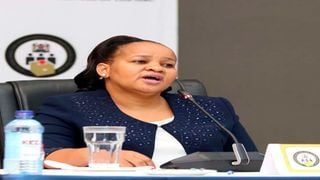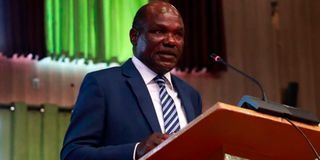
Juliana Cherera, one of the four new IEBC commissioners.
| File | Nation Media GroupPolitics
Premium
Staggered terms for IEBC chiefs as new commissioners appointed
The appointment of four electoral commissioners last week paves way for staggered terms for the poll chiefs, the first of its kind in the management of elections in Kenya.
The Independent Electoral and Boundaries Commission (IEBC) had four vacancies occasioned by the resignations of vice chairperson Connie Nkatha Maina and commissioners Paul Kurgat, Margate Mwachanya, and Dr Roselyne Akombe.
Last week, Francis Wanderi, Juliana Cherera, Irene Masit, and Justus Nyang’aya were sworn into office to complete the seven-member team that will man the IEBC.
The four commissioners will serve a six-year non-renewable term ending September 2, 2027.
This means that the team will also oversee the August 2027 General Election but with the real fear that their term might end before a repeat election in case one is ordered by the Supreme Court.
A repeat election, as by the law, is supposed to happen 60 days after the nullification of a presidential poll by the Supreme Court.

The Independent Electoral and Boundaries Commission (IEBC) Chairman Wafula Chebukati.
The current chairman Wafula Chebukati and commissioners Boya Molu and Prof Abdi Guliye will exit office by January 20, 2023.
The Chebukati-led seven-member team took office on January 20, 2017.
In his submissions to the Building Bridges Initiative (BBI) team last year, Mr Chebukati celebrated the idea of staggered terms for IEBC chiefs.
“The recruitment of IEBC commissioners should be staggered to ensure transfer of knowledge, institutional memory and growth," Mr Chebukati said in his memorandum, insisting that the appointment of commissioners continue to be based on gender, ethnic and regional considerations to ensure inclusivity.
Senate Minority Whip Mutula Kilinzo Jr said staggering the terms of poll referees was an idea whose time had come.
Best proposal
"It is the best proposal (to stagger the terms of IEBC commissioners). It is in line with the best practices the world over," Mr Kilonzo Jr, who is also the Makueni senator, told the Nation.
He added: "During the meetings on the Election Laws Amendment Bill, we made proposals to stagger the terms of the IEBC commissioners in order to ensure that there is no vacancy at any time."
Mr Ndung'u Wainaina, who's the executive director at the International Centre for Policy and Conflict (ICPC), said the new practice of staggered terms for the poll chiefs should be maintained in all future elections.
"We have had some really bad habit in Kenya where a year or so until elections, we wipe out the entire electoral commission and recruit afresh. That is risky. We want to go to a point where the institutional memory of an electoral commission never lapses and that we have some commissioners' term continuing when others end. This practice also speaks to the circle of elections, and the idea that the elections do not just happen on election day. It is an all-round exercise and we need to maintain that institutional memory that then builds the credibility and integrity of the commission," Mr Wainaina argued.
Long journey
Kenya's journey to an independent electoral commission, and now the possibility of commissioners' terms being staggered to guarantee continuity, has been a long one.
Before 1991, elections and the registration of voters were under the supervisor of elections, a civil servant in the Attorney-General’s chambers. The supervisor of elections manned only parliamentary and local elections held in 1969, 1974, 1979, 1983, and 1988. A 1969 constitutional amendment meant that the president was declared winner of non-held popular elections.
Political parties
This was changed in 1997 when an Inter-Parties Parliamentary Group (IPPG) model meant that leading political parties were allowed to name persons to the commission.
That year, Samwel Kivuitu was named electoral body chief replacing Justice Zacchaeus Chesoni, whose appointment by President Daniel Moi in 1991 was furiously opposed by opposition parties with Jaramogi Oginga Odinga famously saying “he cannot serve even as a member of a school committee.”
The appointment of the team that presided over the 1992 elections was made solely by President Daniel arap Moi.
Mr Kivuitu, who died in 2013, was replaced by a nine-member IEBC team led by chairman Issack Hassan in 2011 before the entire commission was sent home in 2016, paving way for Chebukati’s team.





